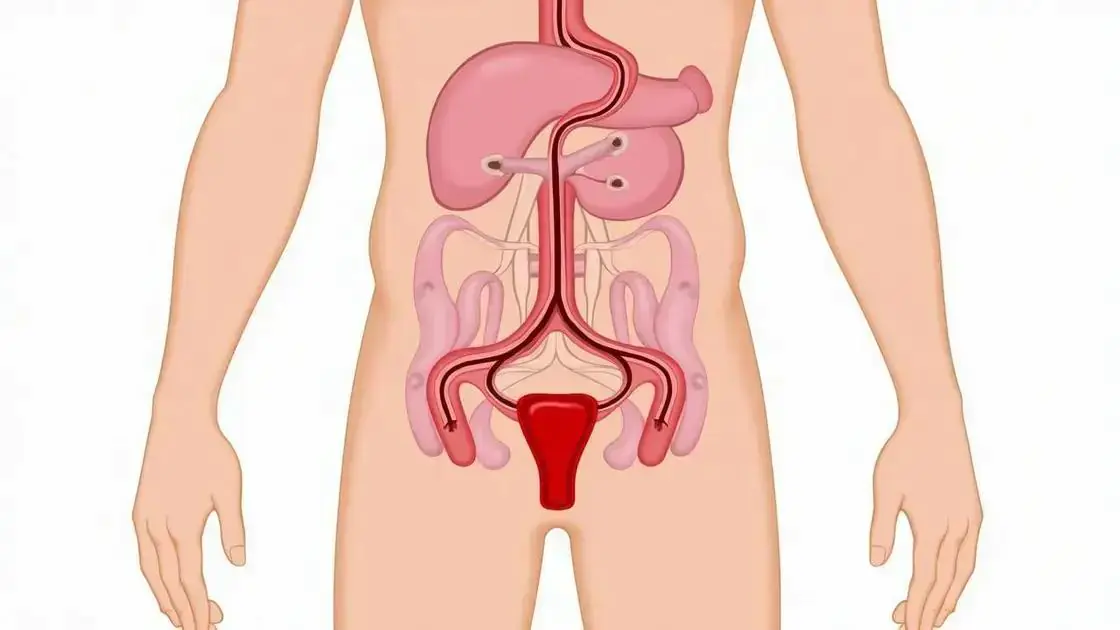Understanding how inflammation impacts erectile function after 50 is crucial for men as chronic inflammation can lead to reduced blood flow and hormonal imbalances, contributing to erectile dysfunction. By implementing lifestyle changes such as a healthy diet, regular exercise, stress management, and seeking medical advice when necessary, men can combat inflammation and improve their sexual health.
As men age, understanding how inflammation impacts erectile function after 50 becomes crucial. Inflammation can lead to various health issues, including erectile dysfunction. This condition can significantly affect a man’s quality of life and intimate relationships. In this article, we will delve into the relationship between inflammation and erectile function, exploring how age plays a role and discussing potential lifestyle changes that may help. Stay with us to learn more about the significance of maintaining healthy inflammation levels for better sexual health.
Understanding Inflammation and Its Effects

Inflammation is a natural response of the body to injury or infection. It is part of the immune system and helps our bodies heal. However, when inflammation becomes chronic, it can negatively affect overall health, including erectile function. Chronic inflammation occurs when the body continues to send inflammatory signals even when there is no injury or disease. This persistent state can lead to various health problems, including heart disease and diabetes, which have a direct relationship with erectile dysfunction.
What Causes Chronic Inflammation?
Many factors can contribute to chronic inflammation, such as poor diet, obesity, lack of exercise, smoking, and excessive alcohol consumption. These habits can lead to the accumulation of fat and toxins in the body, triggering an inflammatory response. Additionally, long-term stress can also elevate levels of inflammation.
The Impact of Inflammation on Health
Chronic inflammation can affect many body systems, leading to complications in various organs. For men over 50, this is particularly concerning because it can impair blood flow and hormone levels, critical factors for erectile function. Studies have shown that increased levels of inflammatory markers in the body are associated with a higher risk of erectile dysfunction.
Understanding the Immune Response
The body’s immune system plays an essential role in regulating inflammation. When functioning correctly, it targets only harmful invaders. However, with chronic inflammation, the immune response can become dysregulated, mistakenly attacking healthy tissues. This can lead to conditions that further jeopardize erectile function, such as pelvic floor dysfunction.
The Importance of Awareness
Recognizing the signs of chronic inflammation is crucial for maintaining health. Symptoms may include fatigue, joint pain, and digestive issues. Men over 50 should monitor their health and be proactive about addressing inflammation to help prevent complications like erectile dysfunction.
The Role of Aging in Erectile Dysfunction

Aging is a natural process that affects everyone, and it can influence various aspects of health, including sexual function. For men over 50, erectile dysfunction (ED) becomes more common, and aging is a significant factor in this condition. As men age, several changes occur in the body that can contribute to erectile dysfunction.
Changes in Hormone Levels
One of the primary changes that occur with aging is a decrease in testosterone levels. Testosterone is essential for sexual arousal and erectile function. When testosterone levels drop, men may experience reduced libido and difficulties achieving or maintaining an erection. This hormonal shift can begin as early as the late 30s but becomes more pronounced with age.
Decreased Blood Flow
Aging also leads to changes in blood vessels and circulation. Over time, arteries may become less flexible and narrow, which can limit blood flow to the penis. Good blood flow is critical for achieving an erection, and reduced circulation can significantly affect sexual performance.
Impact of Chronic Health Conditions
Many health conditions that are more common in older age can contribute to erectile dysfunction. These include heart disease, diabetes, and hypertension. Each of these conditions can damage blood vessels or nerves, inhibiting the ability to achieve an erection. Managing these health issues becomes vital in addressing erectile dysfunction.
The Psychological Effects of Aging
Emotional and psychological factors can also play a role in erectile dysfunction as men age. Worries about sexual performance, anxiety, and feelings of inadequacy can compound the physical issues related to aging. Stress and depression are common among older adults, and these feelings can further affect sexual health.
Importance of Seeking Help
Understanding the role of aging in erectile dysfunction is crucial for men over 50. Recognizing the impact of natural aging, alongside lifestyle factors and health conditions, can empower men to seek appropriate help. Professional advice and treatment options are available to improve sexual function and quality of life.
How Inflammation Affects Blood Flow

Blood flow is crucial for many body functions, including sexual health. Inflammation can disrupt the normal flow of blood, which is essential for achieving and maintaining an erection. When inflammation occurs in the body, it can lead to the narrowing and stiffening of blood vessels, a condition known as atherosclerosis.
How Inflammation Narrows Blood Vessels
Chronic inflammation triggers the release of substances that can damage the lining of blood vessels. This damage causes them to become less elastic and promotes plaque buildup. As plaque accumulates, it narrows the arteries, reducing the amount of blood that can flow through. For men, this decreased blood flow to the penis can lead to erectile dysfunction.
Role of Nitric Oxide
Nitric oxide is a molecule that helps widen blood vessels and improve circulation. Inflammation can decrease the production of nitric oxide, further impairing blood flow. Without enough nitric oxide, blood vessels cannot relax properly, making it more difficult to achieve an erection. This lack of circulation can become a vicious cycle, where inflammation leads to erectile dysfunction, creating more stress and anxiety.
The Connection to Heart Health
Inflammation is not only harmful to sexual health but also impacts heart health. Poor blood flow due to chronic inflammation can lead to heart disease, which is a significant risk factor for erectile dysfunction. As men age, the cumulative effect of inflammation and its impact on the cardiovascular system becomes even more critical, further linking heart health to erectile function.
Importance of Healthy Lifestyle Choices
Maintaining a healthy lifestyle is essential in managing inflammation and promoting good blood flow. Eating a balanced diet, exercising regularly, and avoiding tobacco use can help reduce inflammation levels. These lifestyle changes not only improve overall health but also support better blood circulation, which is vital for sexual function.
When to Consult a Doctor
If you notice persistent issues with erectile function, it is important to seek medical advice. Understanding how inflammation affects blood flow can help in recognizing underlying health problems that may need attention. A healthcare provider can offer guidance on managing inflammation and improving overall health.
Lifestyle Changes to Combat Inflammation

Combating inflammation is essential for maintaining overall health, especially for men over 50 experiencing erectile dysfunction. Making specific lifestyle changes can significantly reduce levels of inflammation in the body. Here are some effective strategies to consider:
Adopt an Anti-Inflammatory Diet
Eating a balanced diet rich in fruits, vegetables, and whole grains can help fight inflammation. Foods like berries, spinach, and nuts contain antioxidants that reduce inflammation. Additionally, incorporating fatty fish such as salmon or mackerel provides omega-3 fatty acids, known for their anti-inflammatory properties.
Stay Hydrated
Proper hydration plays a crucial role in reducing inflammation. Drinking plenty of water helps the body flush out toxins and maintain optimal function. Aim for at least 8 glasses of water a day or more if you are active.
Regular Exercise
Engaging in regular physical activity can help lower inflammation levels. Aim for at least 150 minutes of moderate exercise each week, such as walking, swimming, or cycling. Exercise improves circulation, promotes a healthy weight, and reduces stress, all of which contribute to combating inflammation.
Avoid Smoking and Limit Alcohol
Smoking is a major contributor to inflammation and can lead to various health issues. Quitting smoking can improve overall health and reduce the risk of erectile dysfunction. Additionally, limiting alcohol consumption can also help; excessive drinking can contribute to inflammation and its effects on the body.
Manage Stress Levels
Chronic stress can lead to inflammation, so managing stress is vital. Techniques such as mindfulness, meditation, or deep-breathing exercises can greatly benefit mental well-being. Finding activities that promote relaxation and managing stress can improve overall health and help reduce inflammation.
Get Enough Sleep
Quality sleep is essential for overall health and can help reduce inflammation. Aim for 7 to 9 hours of sleep each night. Establishing a regular sleep routine and minimizing distractions can enhance sleep quality, supporting your body’s recovery processes.
When to Seek Medical Advice

It is essential to know when to seek medical advice for erectile dysfunction, especially as inflammation plays a role in sexual health. If you notice any of the following signs, consider consulting a healthcare provider:
Persistent Issues with Erections
If you frequently have trouble achieving or maintaining an erection, it is important to discuss this with a doctor. Occasional issues are common, but consistent problems can indicate underlying health issues.
Changes in Libido
A significant decrease in sexual desire is another reason to seek medical attention. Changes in libido can be caused by hormonal imbalances, emotional distress, or physical health issues, and should be addressed promptly.
Accompanying Symptoms
If you experience any additional symptoms such as pain during erections, unusual discharge, or changes in urination, it is crucial to talk to a healthcare professional. These symptoms could signal infections or other medical conditions.
Underlying Health Conditions
Men with chronic diseases, such as diabetes or heart disease, should monitor their sexual health closely. If you have one of these conditions and notice changes in erectile function, consult your doctor for guidance on managing your health.
Psychological Concerns
Emotional factors like stress, anxiety, or depression can impact erectile function. If you suspect that emotional issues are contributing to your erectile dysfunction, speaking to a mental health professional is advisable.
Increased Anxiety About Performance
A significant concern or anxiety about sexual performance can create a cycle affecting erectile function. If this anxiety becomes overwhelming, professional support from a healthcare provider can be beneficial.
Understanding Inflammation and Its Impact on Erectile Function
In summary, inflammation plays a significant role in erectile dysfunction, particularly for men over 50. By understanding how inflammation affects blood flow and contributes to various health issues, men can take proactive steps to improve their sexual health.
Implementing lifestyle changes such as maintaining a healthy diet, exercising regularly, managing stress, and avoiding harmful habits can greatly reduce inflammation. Recognizing the importance of seeking medical advice when experiencing symptoms is crucial for effective treatment and management.
Ultimately, by staying informed and taking action, men can combat inflammation, improve erectile function, and enhance their overall quality of life.
FAQ – Frequently Asked Questions about Inflammation and Erectile Function
How does inflammation impact erectile function?
Inflammation can restrict blood flow and interfere with the hormonal balance, leading to erectile dysfunction in men.
What lifestyle changes can reduce inflammation?
Adopting an anti-inflammatory diet, exercising regularly, staying hydrated, managing stress, and avoiding tobacco and excess alcohol can help reduce inflammation.
When should I seek medical advice for erectile dysfunction?
It’s important to consult a healthcare provider if you experience persistent issues with erections, changes in libido, or any additional concerning symptoms.
Can psychological factors affect erectile function?
Yes, emotional issues like stress, anxiety, and depression can significantly impact erectile function and should be addressed.
Is erectile dysfunction common in men over 50?
Yes, erectile dysfunction is more common in older men, often due to a combination of aging, inflammation, and related health conditions.
How important is hydration for reducing inflammation?
Staying well-hydrated helps flush out toxins and supports overall bodily functions, potentially reducing inflammation levels.













